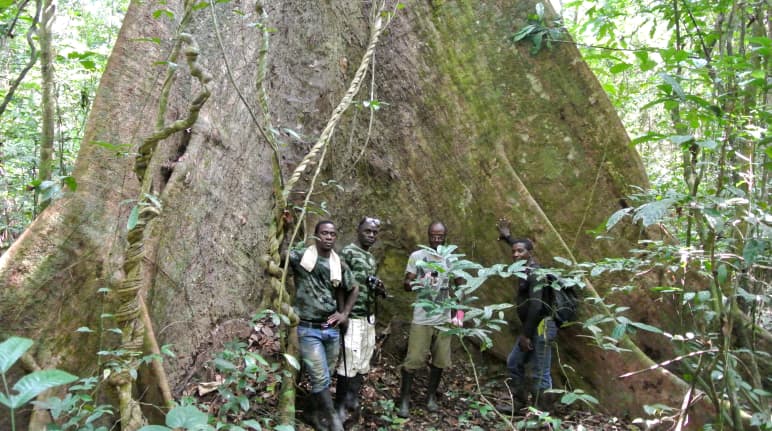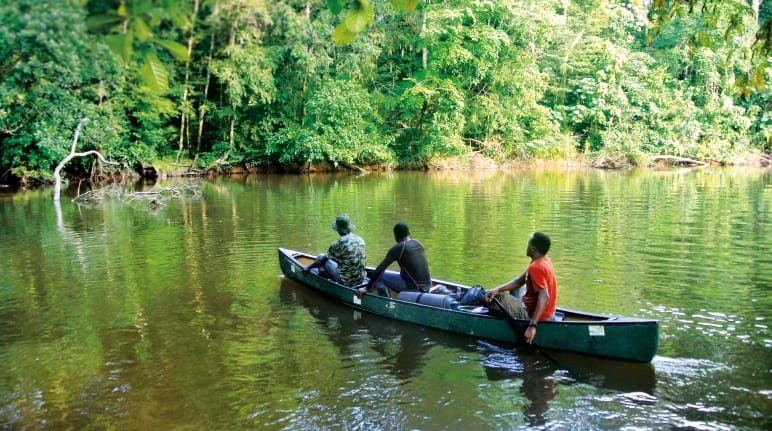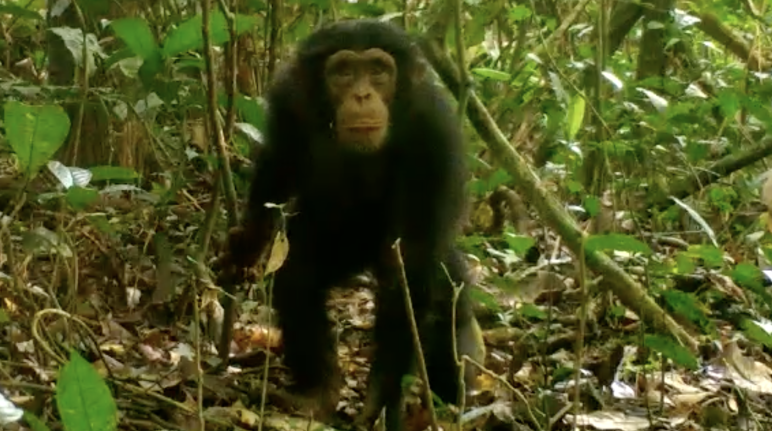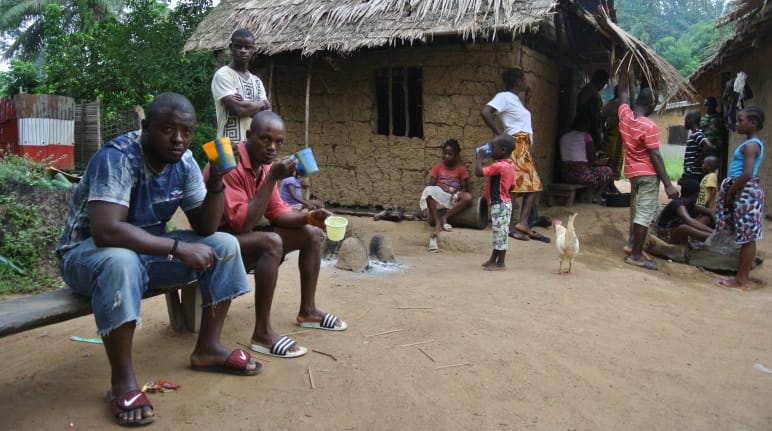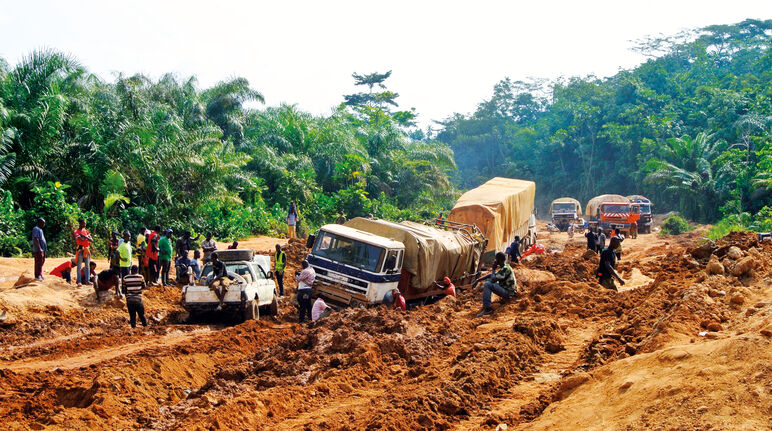Do not sell out Liberia's forests for Dubai's climate excesses!
Liberia is about to hand over one million hectares of forest to Blue Carbon, a UAE-based company that plans to “harvest” carbon credits in West Africa, selling them to offset carbon emissions elsewhere. The proposed deal would trample the rights of hundreds of thousands of Liberians and will do nothing to tackle the climate crisis.
News and updates Call to actionTo: the government of Liberia, the governments of Germany and countries of the global North
“Protect Liberia's forests – do not sell them out to “compensate” Dubai's climate excesses.”
Liberia has a treasure that most West African countries have long since lost: lush tropical rainforests. They cover more than four million hectares and are home to western chimpanzees, pygmy hippos and forest elephants. Hundreds of thousands of people live in these forests and depend on them for their livelihoods.
Liberia is currently being deforested at an unprecedented rate. There is no doubt that the country’s forests need to be better protected for the sake of nature, local communities and the climate.
Blue Carbon LLC promises to do just that: The UAE-based company's business model is to protect forests and “harvest” carbon credits, selling them to offset climate-damaging emissions. If Blue Carbon’s deal with the government goes through, the company would control more than one million hectares of land – ten percent of Liberia’s territory – for 30 years.
Liberian and international environmental organizations are sounding the alarm:
“The draft Blue Carbon agreement violates the progressive land rights and forestry laws of Liberia that protect the free, prior, informed consent of communities. It promises to take away from communities one million hectares of their customary lands and deprive them of their livelihoods,” says Jonathan W. Yiah, Coordinator of the Forest Governance Program at the Sustainable Development Institute (SDI).
Offsets and carbon credits are a false solution to the climate crisis. There are better ways to protect the climate and forests that respect the rights of local communities.
Please urge the government of Liberia to put negotiations with Blue Carbon on hold.
Please call on the governments of Germany and other countries in the global North to reduce their emissions to “real zero” and to meet their funding commitments for forest and nature conservation.
Start of petition: 07/09/2023
BackgroundBlue Carbon LLC
Blue Carbon is owned by Sheikh Ahmed Dalmook Al Maktoum, a member of the Dubai royal family whose wealth is based on oil and gas. The company was founded one year ago and appears to have no experience with carbon credits.
Blue Carbon is based in the United Arab Emirates, which happen to be hosting the COP 28 climate summit in November and December. One of the main tasks of this conference is the further negotiation of Article 6 of the Paris Agreement – which also defines the use of carbon credits.
Greenwashing meets neocolonialism
A possible scenario: The UAE continues to emit greenhouse gases from fossil fuels and offsets them through its own carbon credit scheme in Liberia. On paper, the UAE would thus be able to meet its climate commitments, while Liberia – a country whose emissions are miniscule by comparison – likely can't.
In addition to Liberia, Blue Carbon has signed MoUs with the governments of Papua New Guinea, Tanzania, Zambia, Zimbabwe, and possibly Angola.
Links and sources
Massive carbon offset deal with Dubai-based firm draws fire in Liberia
Blue Carbon LLC’s green grabbing spree continues with a 7.5 million hectare deal in Zimbabwe
https://reddmonitor.substack.com/p/blue-carbon-llcs-green-grabbing-spree
Africa Climate Summit: “It looks like a trade conference on carbon credits”
https://reddmonitor.substack.com/p/africa-climate-summit-it-looks-like
Blue Carbon LLC: A United Arab Emirate company that aims to greenwash the country’s massive carbon footprint
https://reddmonitor.substack.com/p/blue-carbon-llc-a-united-arab-emirate
International statement on the carbon deal between Blue Carbon and the Liberian Government
https://reddmonitor.substack.com/p/international-statement-on-the-carbon
International_Statement_on_the_Carbon_Deal_-_Carbon_Blue_and_Liberia.pdf
Independent Forest Monitoring Coordination Mechanism ‘Sounds Warning Bell’….
Liberia to concede territory to UAE firm in carbon offset deal
https://www.middleeasteye.net/news/liberia-uae-concede-territory-firm-carbon-offset-deal
Cabinet Resolution Concerning Blue Carbon LLC Procurement Process
https://www.ppcc.gov.lr/doc/Cabinet%20Resolution%20Ok.pdf
IFMCM Issues Statement On Proposed Conservation Agreement Between Liberia and Blue Carbon
Zimbabwe
https://carbonherald.com/dubais-blue-carbon-and-zimbabwe-to-develop-carbon-projects/
Angola
Blue Carbon website
To: the government of Liberia, the governments of Germany and countries of the global North
Ladies and Gentlemen,
The world is experiencing a global climate crisis. Heat waves, droughts, floods, and storms are just some of the disasters that are claiming thousands of lives and devastating vast areas.
Offsetting climate-damaging emissions – mainly from the burning of fossil fuels – through carbon credits and other mechanisms is a false solution to this existential crisis. They allow polluters to continue polluting and shift the burden of climate protection to the least responsible countries, harming the livelihoods of local people and violating their rights.
The deal the Liberian government is about to sign with the UAE-based company Blue Carbon is a textbook example: It threatens the land rights and livelihoods of local communities and limits the government's ability to meet its own responsibilities to protect the climate and biodiversity.
There is no doubt that Liberia's forests are threatened by unprecedented rates of deforestation. But it is highly questionable whether the proposed Blue Carbon deal will contribute to their protection in any meaningful way.
We therefore urge the government of Liberia to:
- Put negotiations with Blue Carbon on hold.
- Make all relevant documents available to the public.
- Ensure that offset schemes respect the land rights and livelihoods of affected communities. This includes the National Forestry Reform Law (2006), the Community Rights to Forest Land Law (2009) and the Land Rights Law (2018). Pay particular attention to the principles of free, prior and informed consent (FPIC) and community benefit.
- Evaluate whether carbon credit mechanisms harm or support Liberia's ability to meet its own climate goals.
We call on the governments of Germany and other countries of the global North to:
- Fulfill their responsibility as the countries most responsible for the climate crisis by reducing their emissions to "real zero" – not "net zero" through offsets and carbon credits.
- Ensure that forest protection in Liberia and other countries receives the necessary funding. This must not be realized through market-based mechanisms such as carbon credits. Instead, funds can be generated through fees and taxes on international financial transactions, the elimination of harmful subsidies, and other means.
- Make good on your pledges to help rainforest countries protect their forests, climate and biodiversity.
Protecting Liberia's forests and climate cannot depend on market-based offset mechanisms – least of all those devised by petro-states like the UAE. They are no solution to the climate crisis.
Yours faithfully,
How the climate and rainforests are linked
Rainforests are complex ecosystems in which a vast number of animal, plant and fungi species are tightly interdependent. They play a major role in the local and global climate: In a process called photosynthesis, plants absorb the greenhouse gas carbon dioxide (CO2) from the air. With the help of water and sunlight, they form sugar and from it other plant building blocks. In doing so, plants sequester carbon in stems, leaves and roots while releasing oxygen into the atmosphere.
According to estimates, rainforests sequester 250 billion tons of CO2, much of it in peat forests. Globally, this is equal to 90 times the man-made greenhouse gas emissions per year. 40 percent of the oxygen in the atmosphere comes from rainforests. While the metaphor of forests as the “lungs of the Earth” does not fit perfectly, it certainly does underscore their vital role.
Rainforests themselves produce a large part of the high year-round rainfall they receive. Evapotranspiration, i.e. the moisture that the plants release through their leaves, is an important aspect here. The forests are hot and humid, but the clouds reflect much of the sunlight back into space – thus cooling the atmosphere. Without this effect, the areas would be even warmer.
As carbon sinks and rainmakers, intact forests play an important role in regulating the climate and are crucial to the fight against catastrophic climate change.
The problem: catastrophic climate change and forest destruction
Rainforests are increasingly unable to act as climate stabilizers: When they are destroyed for plantations, grazing area or mining projects, vast amounts of greenhouse gases are released. For example, forest fires in Indonesia accounted for one-third of total global emissions in 1997. The loss of peat forests is particularly devastating.
According to a study published by Nature, rainforests could tip from carbon sinks to carbon emitters solely due to changing climatic and growth conditions from 2035 onward – thus accelerating catastrophic climate change.
Because of the intricate interdependencies of the rainforest ecosystem, the entire web can suffer if it is damaged in one place. Take the water cycle, for example. If drier periods occur as a result of global climate change – and this is already being observed – the cycle may break down. This can lead to evergreen, lush rainforests becoming grasslands with far lower biodiversity. The local climate would become drier and hotter.
The 18 tipping points in the climate system are particularly ominous: If, for example, climate change in the Amazon region reaches a certain point, the process and the loss of the rainforest in its current form will become unstoppable.
One thing is clear: catastrophic climate change is man-made. 98 percent of the scientists who study climate issues agree. Because the climate is a highly complex system, researchers are constantly discovering new relationships, interpreting data in different ways and revising forecasts. This is completely normal in science. However, the findings of climatologists are becoming increasingly alarming.
The solution: rainforest protection is climate protection
Rainforests must be preserved because they are indispensable as carbon sinks and their further destruction would worsen the impact of catastrophic climate change. Climate protection is therefore rainforest protection and vice versa.
- We need to preserve forests and nature and heal damage. Forests are more than just carbon sinks – they are diverse ecosystems and home to millions of people.
- We need to protect the climate while preserving biodiversity. Catastrophic climate change and extinction are two existential crises that we must tackle together.
- We need to secure and strengthen the rights of indigenous peoples, who are often the forest's best stewards: We call it the rainforest – they call it home.
- We need to fundamentally change our way of life and how we do business: This will mean reducing our consumption of energy, food and raw materials instead of maintaining it by turning to “green products”. We must stop burning fossil fuels.
- We need to reform flawed climate policy: We must end the misguided use of biofuels, especially if they are based on palm oil, soy or sugar cane, and stop burning trees in power plants.
- We reject offset programs as a modern “indulgence trade” in which companies finance environmental protection measures in return for being allowed to pollute. We also reject supposedly more climate-friendly “bridge technologies” like replacing coal with natural gas.
- In the wake of the Covid pandemic, we need to rebuild the economy and society in an environmentally sound way. There must be no economic “stimulus programs” based on old formulas.
At the same time, Covid has shown that we are capable of creating rapid and profound change in the face of an existential crisis.
Liberia: Ecoguards patrol hundreds of kilometers on foot to protect chimpanzees

Rainforest Rescue has been working with the Wild Chimpanzee Foundation (WCF) for several years to preserve the habitat of critically endangered chimpanzees in Liberia. At the heart of this effort are the Ecoguard patrols. The men and women from villages on the edge of the Grebo-Krahn and Sapo national parks are doing an amazing job with tangible success.
Carbon credits: The next round of indulgence trade in Liberia
The battle over Liberia's forests – supposedly in the name of climate protection – is entering a new round. BluEarth Carbon, a U.S.-based company, wants a piece of the lucrative carbon credit market. For the past year, a Dubai-based carbon trader has been trying to cash in on Liberia's forests in the same way.
For true climate protection: Don’t fuel the fire!
Europe officially committed to phasing out fossil fuels at the COP28 climate conference. In reality, the EU wants to fall back on dangerous distractions and false solutions like carbon capture and storage. Rainforest Rescue and over 140 other organizations are calling on the EU to support real climate action!
Côte d’Ivoire: A safe forest corridor for chimpanzees
Good news for West Africa’s chimpanzees: Cavally Forest in Côte d'Ivoire has been declared a nature reserve. This will afford better protection to the link between the Taï and Sapo national parks and thus the primates’ habitat.
deal with the governmentThe “conservation agreement” was negotiated behind closed doors. The MoU was signed on March 25, 2023. Government sources leaked the information to environmentalists prior to the government initiating consultations with them in early August.
Sustainable Development InstituteSDI is based in Monrovia and is a member of the Independent Forest Monitoring Coordination Mechanism (IFMCM), a group of seven Liberian civil society organizations.
This petition is also available in the following languages:
Help us reach 100,000:











